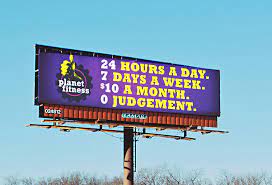
So… here are the two universal appeals to Cult Branding:
1. You are special
and
2. It’s not your fault
I won’t insult your intelligence by belaboring why those appeals are universally powerful.
Either you’re mature enough to intuitively recognize their power, or you can stop reading.
Still with me?
Now let me ask what your advertising is doing to communicate those appeals to your prospects.
Or… how are you avoiding inadvertently communicating the opposite?
Because businesses struggle to grow then they make prospects feel like:
- a number (or worse, a sucker), or
- that they have to be in “a state of grace” to do business with you
“Your call is very important to us, so please hold for 15 minutes before we get a human to actually talk to you.”
“Sure we can do your taxes, right after you pull all your paperwork together and get us pre-compiled numbers to calculate with”
 Or on the positive side, there’s Planet Fitness, which earns about $1.2 Billion in earnings every year.
Or on the positive side, there’s Planet Fitness, which earns about $1.2 Billion in earnings every year.
That’s billion with a “B”
For a gym franchise.
Their marketing strategy?
Ensuring that members don’t feel bad about walking into a gym when they’re out of shape or aren’t really sure how to work out.
They are implicitly appealing to customers with an “it’s not your fault” message.
It’s not your fault that regular gyms make you feel bad.
In fact, if you feel that way, you’re our kind of people, and we know how to get you to your goals without the awkwardness and shaming that’s part of most gyms.
Don’t have money for a “joining fee” no problem. We got you covered.
Then there’s Apple.
Hey, if other computers feel difficult to use, it’s not your fault. In fact, it’s because you’re special — you, my friend, are a creative. And we’ve made a computer just for people like you.
And last I checked, Apple was one of the most insanely profitable companies in the world.
Now, take note: You don’t want to ham-fistedly and explicitly SAY that people who buy from you are “special”
You want, instead, to make your customers FEEL special.
And the first step to that is making them feel included — as if your company exists specifically to serve people just like them.
How do you do that?
First, you can bond with them over shared humanity. Make people feel included.
Second, you can cater to their needs in ways that other companies don’t.
Finally, you can deliver service that makes them feel cared for.
Apple certainly managed to bond with people over shared humanity, but none of that would have mattered if their operating system and computers weren’t actually easy and fun to use.
And even then, Apple went the extra step with Apple Care and their Apple stores to ensure their customers felt well-cared for.
But don’t think this is a process that only works for world-changing companies like Amazon, Apple, or Tesla.
My partner Chris Torbay recently wrote an ad for an insurance company that did all these things brilliantly.
Check out the script:
My name is Michelle, and I work for Chapman Insurance. I work in the call center answering the phone. What kind of job is that you’re thinking? Well, when it’s your call, maybe I make a difference for you. Maybe you were dreading another one of those stupid corporate phone things with their “press one” and “press two” and “press six if a palm tree just fell on your dog house.”
But you get to talk to a person, and you get to tell a real person how worried you are. And I get it, because I’m a real person, and I do this for a living. And I can see your policy and answer your questions because I know how confusing this can be!! And when you hang up, you feel like someone with a heart and a soul, and a pretty awesome understanding of insurance has had the basic human decency to answer the phone and talk to you like a person instead of making you press six!!! My name is Michelle. I work with Chapman and your insurance call matters to me!!!!
So let’s take it by the numbers:
- Bonding over the shared aggravation of phone trees? Check
- Making sure the customer feels special (and not like a number)? Check
- Assuring customers that it’s not their fault if they feel insurance is confusing and they need help? Check
- Catering to the customer’s needs in ways other insurance companies don’t? Check
- Delivering a service that makes the customer feel cared for? Check
So, no, you don’t have to be some high-flying tech company in some sexy industry to make this work.
It’s not complicated.
(though communicating it in an ad IS a complex skill)
But it is hard.
Of course, hard is comparative.
Growing by double digits every year is hard, too.
But if you do this, then massive growth will become comparatively easy.
So choose your hard and grow — by making use of these universal appeals.
And if you need help communicating these appeals in your ads, that’s not your fault — you’re a business owner, not a copywriter, after all.
And as it turns out, I live to help kick-a$$ business owners like you launch branding campaigns based on these appeals.
- Are You Paying for Too Much for the Wrong Keywords? - July 15, 2024
- Dominate Your Market Like Rolex — 4 Powerful Branding Lessons - July 3, 2024
- Military-Grade Persuasion for Your Branding - June 25, 2024
